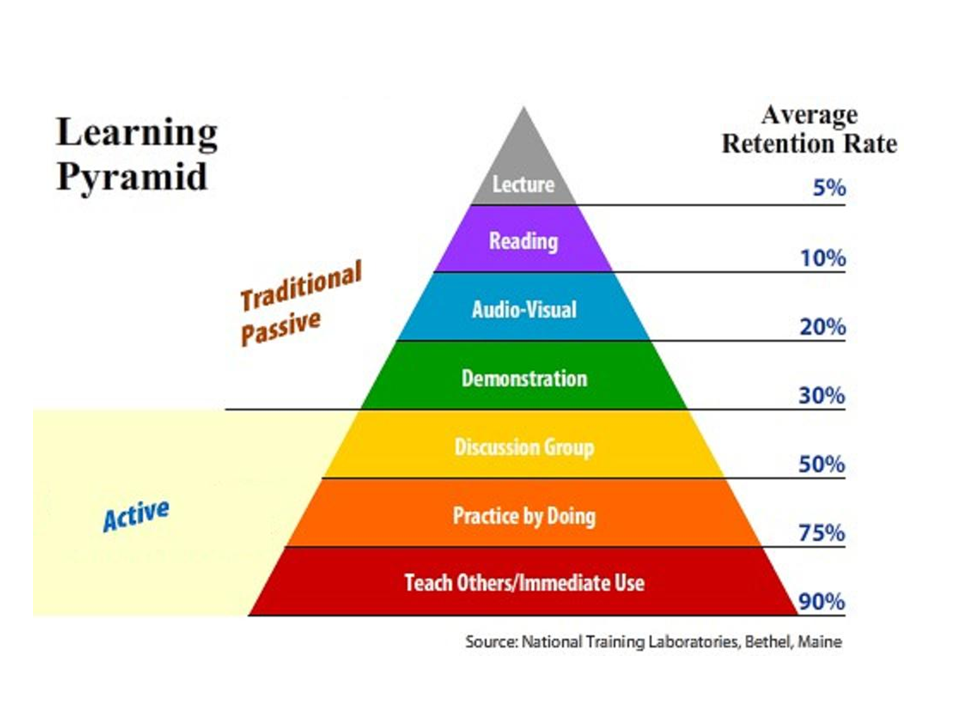How to Remember and Not Forget: The Power of MicroGroups

The Learning Pyramid can change the way we present information for long-term retention. That's why MicroGroups are so effective. A MicroGroup is based on replication, multiplication, and transformation, not merely dissemination of information. See the 90% compared to the 5% of telling/talking?
People don’t remember sermons or speeches—they don’t even remember paragraphs. What people remember are simple statements, slogans, and phrases. I don’t remember any speech John F. Kennedy gave, but I do remember his statements, “Ask not what your country can do for you, ask what you can do for your country” and “I am a Berliner!” Neither do I remember any sermon preached by Dr. Martin Luther King Jr., but I do remember his famous phrase, “I have a dream!” - Rick Warren, The Purpose Driven-Church: Growth Without Compromising Your Message and Mission
Many speakers are aware that a 20-minute sermon is soon forgotten. What do you remember? Rick Warren estimates that we forget 95% of what we hear after 3 days.
Learning Ladder
Another way to clarify the value of MicroGroup experiences is the learning ladder, similar to the Learning Pyramid in the initial image.
- Hearing
The first rung of the learning ladder is hearing, where new information is introduced for the first time. This stage involves passive reception, such as listening to a podcast, attending a seminar, or watching a presentation. At this level, learning is purely external and requires minimal engagement. For example, someone listens to an explanation about what it means to be a Christian, but hasn’t yet grasped the concept. They may be "Christian in name only," a nominal label, not really believing in their hearts, not trusting Jesus as their Savior and Lord. - Understanding
After hearing comes understanding, where the information begins to make sense. This step involves processing what was heard, asking questions, and seeking clarity. The power of Discipleship Essentials is in the freedom to build relationships in a safe environment. Ask questions, even "dumb" questions and search out resources for answers. Discuss with each other. - Memorizing
The third rung, memorizing, involves committing the information to memory. At this stage, the knowledge is familiar but not yet fully applied. Rote memorization is common here without fully grasping its application. This stage builds a foundation but doesn’t yet lead to deeper insights. Memorization is a foundational principle for recall. As the Word of God, recalling verses in times of trouble reinforces the presence of God. "God's got this!" He will give you the right words and actions at the right time. We can pray Scripture over others and ourselves. - Applying
In the applying stage, the information is used in practical contexts. This step bridges theoretical understanding with real-world use. For example, God tests us. Application solidifies understanding through practice and active involvement. - Analyzing
Analyzing requires breaking down information into components and assessing relationships. At this level, evaluate how the pieces fit together. For instance, SOAP devotions encourage deeper insight and problem-solving skills. - Evaluating
The evaluating stage involves forming judgments based on criteria and evidence. Here, ideas are compared, contrasted, and prioritized. Evaluation fosters discernment and informed decision-making. The readings within Discipleship Essentials provide specific examples of stories of those who walk in alignment and attunement with God's plan. - Creating
At the creating stage, knowledge is synthesized to produce something original. This could involve designing a new experiment or developing a model to illustrate photosynthesis. Creating represents the peak of cognitive learning, where knowledge is not only understood but also innovatively applied. - Experiencing
The experiencing level is where learning transforms into lived reality. No one can really understand the power of a MicroGroup until they are in one! In other words, we do not learn to swim by reading a book. Information is internalized and integrated into daily life. This stage signifies personal ownership of knowledge. Each of us is beginning to live out who we were uniquely created to be. That glorifies God and gives us joy. - Teaching
A natural extension of experiencing is teaching, where the knowledge is shared with others. Teaching solidifies understanding and often deepens the experience. Leading a MicroGroup on how the Holy Spirit pervades our decisions, listening skills, and relational goals, reinforces becoming more like Christ. - Transforming
The final stage, transforming, occurs when learning influences identity and long-term behavior. It goes beyond experiencing to reshape values and worldview. By applying the principles of Christian living leads to a lifelong commitment to be a disciple of Jesus Christ and practice becoming a disciplemaker.
This stage represents a holistic integration of knowledge into your own life purpose. You know why you are alive! "I will do this the rest of my life!"
Be a disciplemaker
Transitioning from passive reception to active participation, and finally, to transformative application integrates knowledge into personal and spiritual growth. Become the person you were created to be and experience the joy of bringing glory to God for your good.
Member discussion